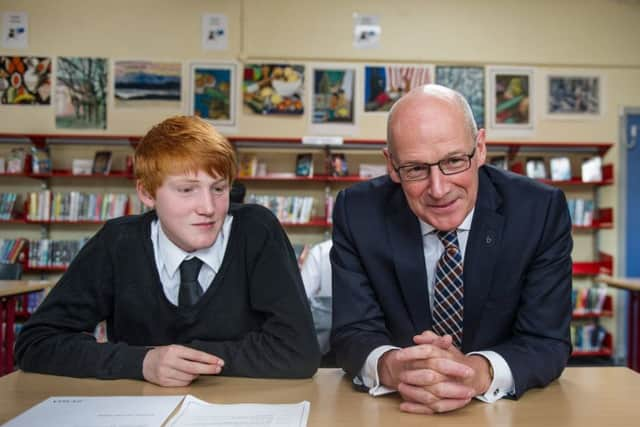Tom Peterkin: Will '˜Year of Young People' see demise of named person scheme?
Four years ago Alex Salmond announced that 2018 would be Scotland’s “Year of Young People”. With an aim of celebrating the talents of Scotland’s youth while inspiring young people to achieve their ambitions, the events planned for 2018 promise to be uplifting.
The Year of the Young People organisers are promising an extravaganza of cultural, sporting and educational events with an emphasis on six key themes: culture; participation; enterprise and regeneration; equality and discrimination; health and well-being and education.
Advertisement
Hide AdAdvertisement
Hide AdStanding on the cusp of this praiseworthy initiative, however, it is also clear 2018 will see the latter two themes (health and well-being plus education) becoming battlegrounds for a baser form of politics than the lofty ideals promoted by the Year of Young People.


In the case of young people’s health and well-being, Education Secretary John Swinney is bracing himself for yet more fights over the deeply controversial named person scheme.
The proposal to give every child in Scotland a named person with responsibility over their well-being has suffered the indignity of being blocked by a Holyrood committee.
The whole thing has turned into an unholy mess and the delays which have beset the plans mean that the fight for their future will overrun into a parliamentary session which Mr Swinney has already earmarked for another raft of legislation that lies at the heart of young people’s education.
Next session will see the named person legislation overlapping with Mr Swinney’s much vaunted – and also controversial – Education Bill, which aims to introduce the most radical school reform seen in Scotland for a generation.


The clash of these two tricky pieces of legislation will cause all manner of challenges for Mr Swinney, who must be looking towards 2018 with trepidation.
Recognised as Nicola Sturgeon’s most capable minister, Mr Swinney has been given the education brief because he is one of the few politicians at her disposal with the ability to deliver the turnaround she has promised for Scottish education.
With that in mind, Mr Swinney’s Education Bill promises a restructuring of the education system that will see the establishment of six regional bodies or Regional Collaboratives, which aim to share good practice across council boundaries.
Advertisement
Hide AdAdvertisement
Hide AdThere has, however, been resistance from councils, who were concerned that democratically elected local authorities were being sidelined. A compromise was eventually brokered that satisfied some of the councils’ concerns.
There remain local government concerns, however, about the most eye-catching aspect of Mr Swinney’s reforms – to hand more power to head teachers over the running of their schools.
Time and again education experts have pointed to the excessive bureaucracy, the teacher recruitment crisis, low morale in schools and the confusion which is endemic in the flagship Curriculum for Excellence.
Mr Swinney is under enormous pressure to succeed in his quest and he believes giving schools more autonomy will move things in the right direction – in particular when it comes to closing the iniquitous attainment gap that sees children from richer backgrounds do better in the classroom than their poorer counterparts.
But once again, the Education Secretary will have a battle on his hands as he tries to engineer change that will benefit Scotland’s young people while meeting the political expectations of Ms Sturgeon, who has very publicly staked her own reputation on sorting out education. With this bulging in-tray for 2018, one suspects Mr Swinney feels he could very well do without the complicating distraction of the named person fiasco.
In public, Ms Sturgeon and Mr Swinney say their commitment to the policy is undiminished. But in private there must be questions about the wisdom of persisting with this unpopular policy. As has often been stated, there is no quarrel with the policy’s aim of protecting young people from harm. Rather, it is the insensitive manner in which it has been handled and the perception of state-sponsored snoopers undermining the privacy of family life.
The courts have already taken exception to the notion of information about children being shared without parental permission. Expert witnesses to the education committee have condemned the complex and incomprehensible language associated with the initiative. The health visitors and teachers, who would be expected to take on the named person mantle are concerned about its impact on their day jobs.
The legislation was delayed when a majority of MSPs on the education committee took the unusual step of deciding against producing a report required for the Children and Young People (Information Sharing) Bill to pass to the next stage of the legislative process. MSPs complained that Mr Swinney had failed to produce enough information to allow them to scrutinise the proposal properly.
Advertisement
Hide AdAdvertisement
Hide AdMeanwhile, the anti-named person campaigners, who have already successfully challenged the policy in the courts, believe they could have a case for a second legal action – arguing that concerns about the legislation have yet to be addressed.
Mr Swinney must be hoping he can salvage something from this wreckage.
But as the Year of the Young People approaches, his chances look slim.